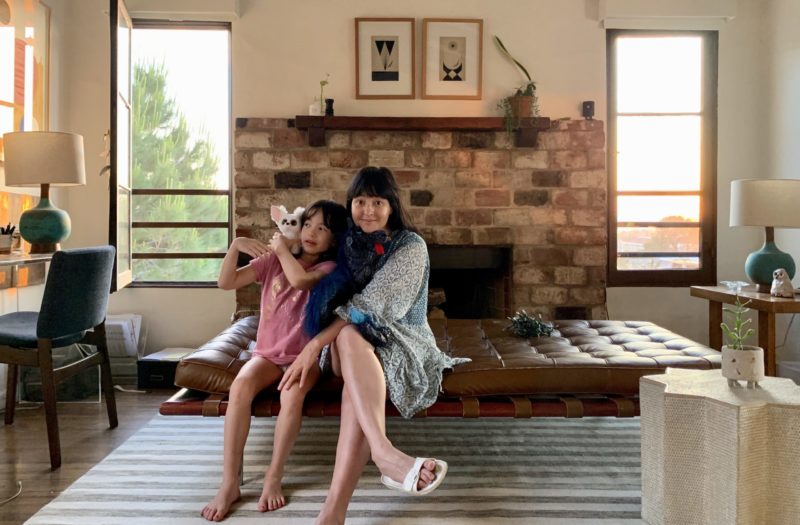Do you remember the movie Beaches? I know, it came out 400 years ago, and it’s unbelievably schmaltzy, but go with me on this for a second.
There’s a scene about two-thirds of the way though. The actor Barbara Hershey is looking pale and sickly while standing in the doorway of a beach house at dusk, watching her childhood best friend (Bette Midler) play with her young daughter on the beach. At first Barbara is happy, because her daughter is happy. But then the joy starts to drain from her eyes because she can’t play on the beach — she’s too sick. And that’s unfair. In fact, it’s infuriating.
A few scenes later the mawkish song Wind Beneath My Wings nails the point home: Due to her illness, Barbara Hershey couldn’t soar high into the sky, she just supported those who could.
Way before I got psoriatic arthritis, that beach scene scared the hell out of me. I vowed that I would never be like Barbara Hershey — I’d never look on from a window while other people had all the fun.
How ‘Beaches’ Became My Life
But these days, thanks to COVID-19 and a PsA flare that isn’t responding to medication, a version of that scene plays out at my house on a regular basis. On days when it’s too painful for me to play with my 7-year-old daughter, her dad enthusiastically steps in. They swim, make up whole worlds, garden, and I end up — you guessed it — watching from a window. It’s unfair, I think. In fact, it’s infuriating.
Suddenly I have become Barbara Hershey. Cue the music, call Bette Midler, I hate this.
Pre-coronavirus, it was much easier to hide that there was anything wrong with me from my child — and, I think, from myself. If she didn’t know about my psoriatic arthritis, I thought, she would feel safe and secure that her mom is in perfect health. And if she didn’t know, I could also pretend that I was a mom in perfect health.
But if she did know, I thought, my daughter might worry, feel anxiety, or try to take care of me. Since she was in elementary school most of the day, I could mostly hide that there was anything wrong at all, except when I just couldn’t handle pain or exhaustion anymore and I told her I was just “really tired.”
Talking About Psoriatic Arthritis with My Daughter
Now that my daughter is home all the time, she’s started doing something I never expected: She imitates me. I realized this when we were walking the dog, and all of a sudden she said that her “knee was swelling up” and “maybe I shouldn’t walk much farther.” I watched as she started to limp a little in a ginger way, and realized she was doing what I do. She’s also said her lower back hurt, and that she was “too tired to play and needed to rest.”
Alarmed, I called my therapist Harriet, who also sees children. I told her what was going on, and Harriet said what my daughter was doing was completely normal. Kids like to imitate their parents, of course, so she suggested I use that as an opening to telling her the truth about my health. The next time she imitated my walk, I could playfully say, “You’re trying to walk like Mama, aren’t you? Is that how I look when I walk?” Then I could tell her that I have an illness, and sometimes it makes my body hurt. I could add that my daughter doesn’t have that illness, which is great. I could also say that I was lucky because there was medicine that really helped.
I tried this technique, and at first it went well. But then my daughter threw me a curve ball. “If you have good medicine, then why do you hurt so much right now?” she asked.
Uhhhhhhh. I was stumped. But I then I recalled the other thing Harriet said: Be honest. Not to the point where I tell her things she can’t developmentally handle, but to the point where she understands reality. So I told her the truth: My old medicine wasn’t working well anymore, but my doctor was getting me a different one to try, and I was looking forward to that.
Modeling Self-Care Instead of Self-Pity
An honest approach is already reaping benefits. My daughter isn’t imitating me anymore — she’s way too busy being a busy and active almost-second grader. I’m excited to see that she has started practicing empathy more at home. For example, she recently told me I looked like I need a little rest. I honestly did, and I told her how I appreciated her kind offer.
I also like that, unlike before, my child is living in reality, and so am I. Instead of denying my illness, I’m trying to model truthfulness, self-care, and resilience for her.
Now when my child plays with her dad and I can’t join in, I don’t silently wallow in a fit of self-pity. I just gratefully take a much-needed nap.
Track Your Psoriatic Arthritis Symptoms with ArthritisPower
Join CreakyJoints’ patient-centered research registry and track symptoms like fatigue and pain. Learn more and sign up here.






